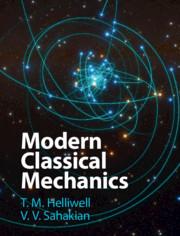A particle of mass (m) is subject to a central force (F(r)=-G M m / r^{2}-k /
Question:
A particle of mass \(m\) is subject to a central force \(F(r)=-G M m / r^{2}-k / r^{3}\), where \(k\) is a positive constant. That is, the particle experiences an inverse-cubed attractive force as well as a gravitational force. Show that if \(k\) is less than some limiting value, the motion is that of a precessing ellipse. What is this limiting value, in terms of \(m\) and the particle's angular momentum?
Fantastic news! We've Found the answer you've been seeking!
Step by Step Answer:
Related Book For 

Question Posted:





